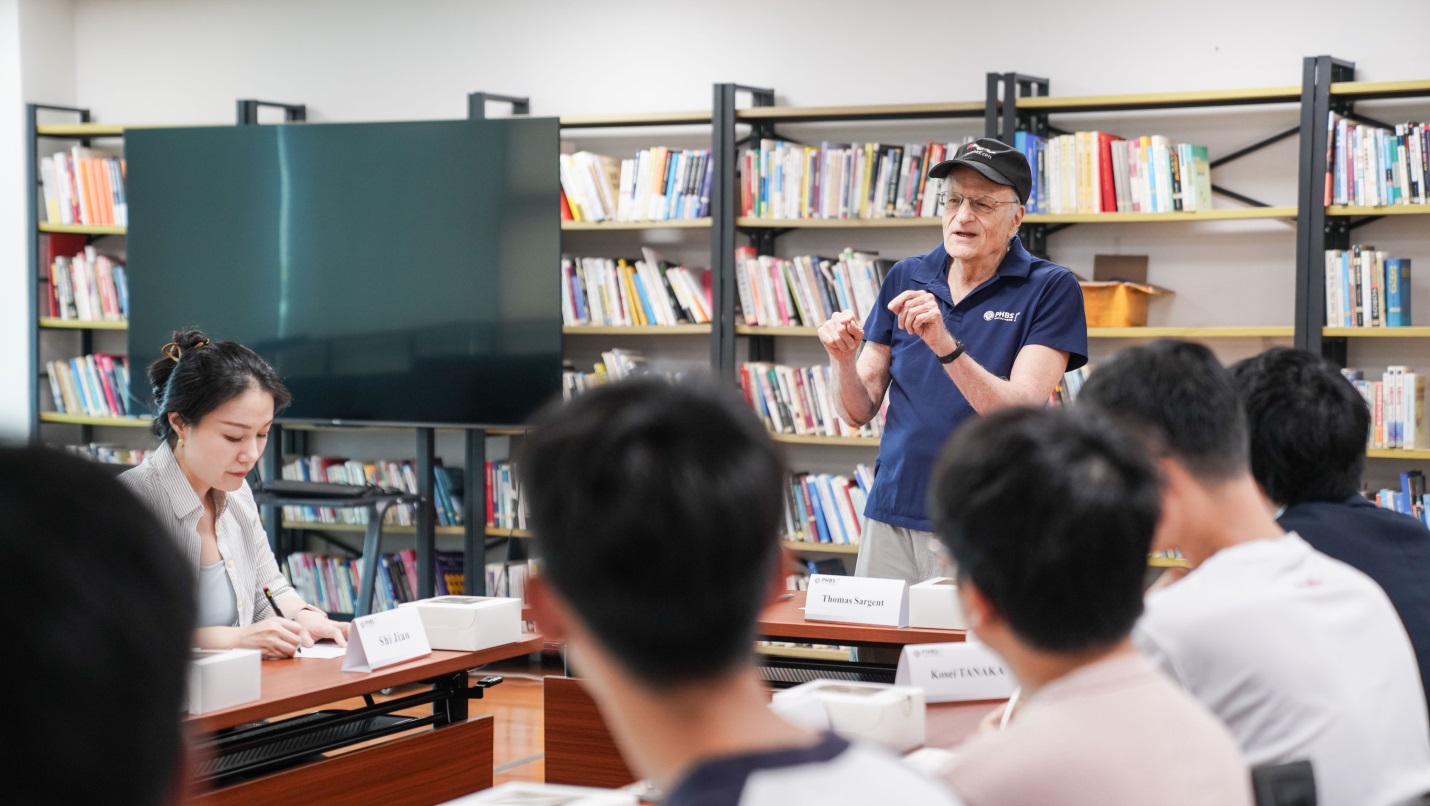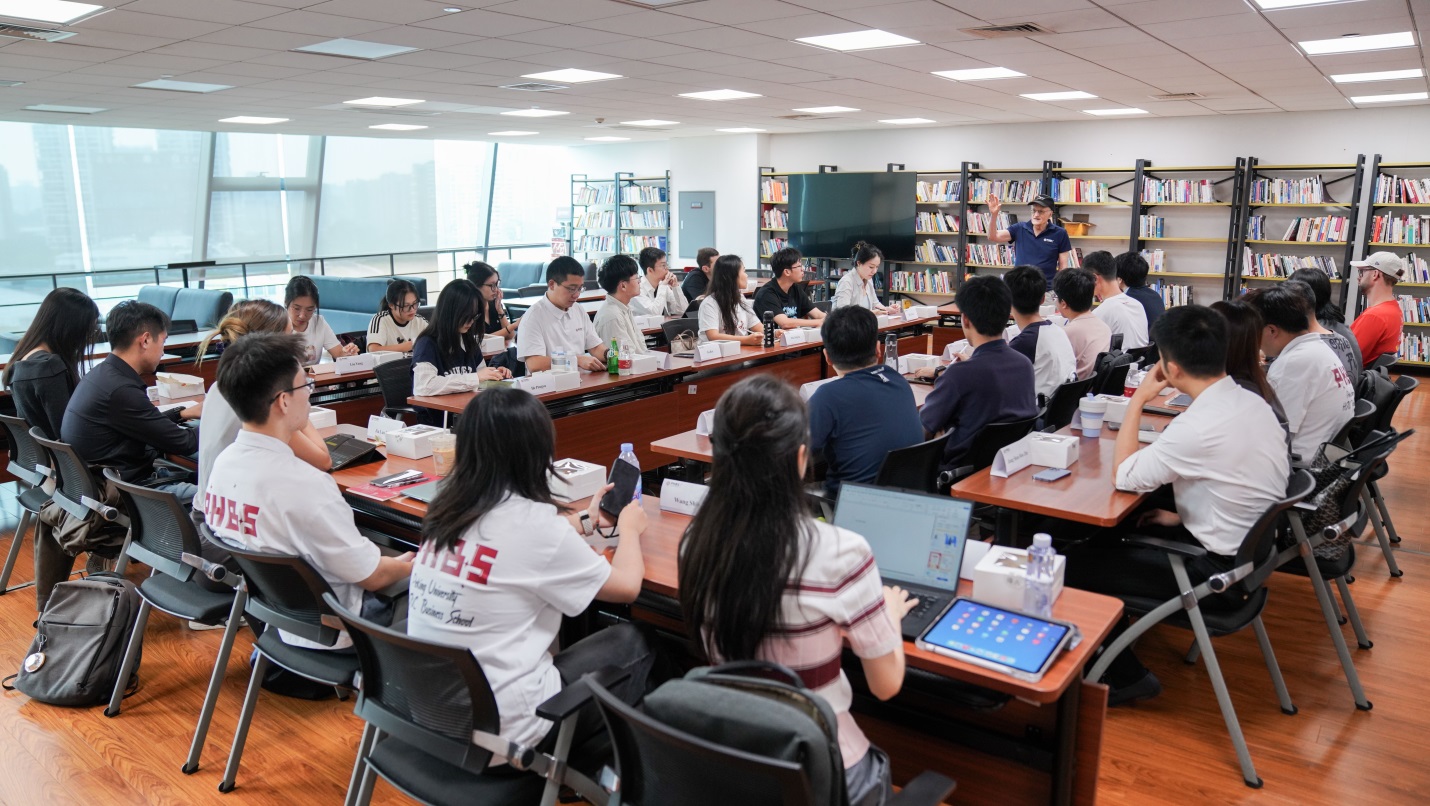On October 30, 2024, the event "Nobel Dialogue: A Tea Party for PHBS Student " was held at Peking University HSBC Business School (PHBS). Thomas J. Sargent, the 2011 Nobel laureate in economics and honorary director of the Sargent Institute of Quantitative Economics and Finance (SIQEF) at PHBS, engaged in an informal discussion with thirty full-time master's and doctoral students over tea. The event was hosted by Associate Professor Shi Jiao, deputy director of SIQEF.
The face-to-face dialogue with Professor Sargent
At the tea party, Professor Sargent, drawing on his extensive academic background and rich research experience, engaged in insightful discussions on topics such as "posing new research questions" and "generating fresh ideas." He used examples like "Ptolemy's Model," "Copernicus's Challenge," " Tycho Brahe and Data Refinement," and "Kepler’s Refinement to Ellipses" to demonstrate how scientists achieved theoretical breakthroughs by refining models and challenging existing paradigms. He highlighted that scientific advancement frequently stemmed from the combination of intuition, aesthetics, and mathematical knowledge, and encouraged students to uphold a mindset of inquiry and exploration in their economic research endeavors, continually expanding the frontiers of knowledge.
 Professor Sargent shares his insights and takes questions from students
Professor Sargent shares his insights and takes questions from students
During the interactive session, students actively posed questions and engaged in in-depth discussions on topics such as "Lessons Learned from Economic History," "The Impact of Artificial Intelligence," and "Large Language Models." Professor Sargent listened patiently and provided professional and specific answers to each question, offering valuable insights and advice.
Here is a closer look at three selected questions and their answers from the Q&A session:
Q&A Session
Q: Will artificial intelligence change some micro foundation of macro research?
A: There are a lot of questions about artificial intelligence circulating on WeChat and the Internet. Many of these questions are broad, partly because AI itself is often misunderstood. What does AI really mean? At its core, it’s just a function—a mapping of X into Y—essentially fitting a function. X can be high-dimensional, and Y can be high-dimensional too, but fundamentally, it’s about function fitting. When it comes to the micro foundations of macro research, AI doesn’t fundamentally change them. I could show you cutting-edge machine learning work, but it’s still about doing tasks we’ve always wanted to do, just with larger computers and more data. The algorithms themselves aren’t entirely new. For the true foundations, consider the essential structure defined in foundational economic theory, such as in a paper I saw this morning. It outlines the basics: a collection of individuals with specific goals, constraints, resources, production functions, technologies, and markets. Some markets might be missing, but overall, there’s a coherent system of optimization problems that fit together, with a government that can influence the environment. Those are the true foundations. AI, including tools like ChatGPT, isn’t going to propose a new foundation that excludes people or governments—and if it does, it’s simply hallucinating.
Q: Have you ever held a theory you once believed to be true but later realized—perhaps much later—that it was flawed or needed modification? Could you share an example? Specifically, I’d like to know what signals or insights led you to recognize that the theory needed adjustment and how you realized it was wrong.
A: It’s pretty straightforward. When you have a quantitative theory, especially in macroeconomics, it’s built to explain specific datasets or time series. After working hard to fit the parameters, you move to validation. Often, during this process, the data reveal that the model doesn’t work well in certain dimensions. By drilling down, you can identify precisely where it falls short and adjust accordingly. Classic examples include longstanding puzzles like the equity premium puzzle or the volatility puzzle.
Take Robert Shiller’s famous volatility puzzle. It’s been the starting point for decades of research, but recently, someone re-evaluated it, questioning whether the data was constructed in line with the theory’s intended definitions for dividends and returns. Using more refined definitions, they found that a big part of the puzzle disappears. This is a reminder of the risks of accepting data as-is, without re-examining it in light of theory.
Another approach is more intuitive—what Bob Lucas did, for example. He sometimes dismissed elements he found aesthetically unconvincing, saying, "I don’t believe it; it just doesn’t ring true to me." He trusted his instincts, which not everyone gets to do. But that’s what makes economics both challenging and exciting; it combines rigorous data analysis with intuition.
Q: Before you became the renowned Sargent, did your ideas come naturally, or did they evolve over time through hard work? Were they the result of intuition and creativity, or did they stem from persistent effort? And how did you know which direction to pursue?
A: It’s simpler than it seems. Don’t get caught up in whether ideas are “great” or “important.” For example, I once got interested in a technical problem through a paper by Milton Friedman. James Tobin and Robert Solow, two economists I admired, wrote mathematical versions of Friedman’s ideas, only to end up disproving them. Their work fascinated me, even though I was just an average student at the time. While in the Army, I studied time series analysis to understand Solow’s paper. After a year, I finally felt ready to apply what I’d learned, and I spotted a flaw in Solow and Tobin’s interpretation. I wrote a four-page paper on this, but my first submission was harshly rejected. I shelved it until an older friend shared it with Carl Bruner, who published it in a new journal. Over time, even people like Tobin and Lucas read it. This wasn’t a breakthrough; it was just a long journey to understand others’ work better. Most discoveries aren’t lightning bolts of genius—they’re slow, deliberate efforts. If great minds can work this way, so can the rest of us.
Click to check the dialogue minutes
Professor Sargent's insights have resonated deeply with students from a wide range of academic fields. As we explore the core of their feedback, it becomes apparent that his guidance has served as a potent catalyst for intellectual growth and a beacon of inspiration for their future academic pursuits.
Comments from Students
During the discussion, Professor Sargent illuminated the path to innovative research by tracing the evolution of theories that describe the laws of celestial motion. He emphasized that innovations can stem from various sources, ranging from the desire to comprehend the laws of nature more deeply to the aesthetic pursuit in theoretical modeling. On this basis, he believed that to answer the question of how to choose a research direction, one should follow one's heart, do research that one is interested in, and enjoy the research process without fear of failure. After learning his philosophy of life, I benefited a lot.
—Zhou Enze, Master of Quantitative Finance, 2022 Intake
I was fortunate to attend a brilliant lecture by Professor Sargent. He adeptly cited the stories of great scientists such as Copernicus, Kepler, and Newton exploring the mysteries of the cosmos, which stimulated our passion for scientific research and deep contemplation. Professor Sargent believes that having an interesting idea is vital when selecting research topics. Such an idea can guide us into the unknown, ignite our curiosity and desire to explore, and thereby drive the advancement of science.
—Liu Jiaming, Master of Management, 2022 Intake
Professor Sargent has unique insights and profound thinking. In the sharing, he explained complex economic theories clearly and concisely, sharing cutting-edge research results, explaining the difficulties and joys of academic research based on personal experience, and also providing many suggestions for students who want to engage in economic research. I have benefited greatly and gained a deeper understanding of economics.
—Liu Wanqin, Master of Economics, 2022 Intake
The discussion with Professor Sargent was a wonderful academic feast. He approached the topic by addressing "what constitutes good research and how to conduct meaningful research." He drew parallels from historical events to contemporary developments, highlighting that the advancement of science is never easy, but what remains constant is the awareness of problems and the curiosity and determination to solve them. As a student majored in Financial Media, this discussion gave me a fresh understanding of the profound insights in economics and the importance of interdisciplinary approaches. His views on research and rigor in academia, and the valuable questions raised by my peers have been incredibly enlightening.
— Jiang Yulu, Master of Financial Media, 2024 Intake
Professor Sargent discussed the origins of the heliocentric theory and Kepler's laws, clearly explaining how the research methods and paradigms from the natural sciences are also applicable in the field of economics. He emphasized that contemporary economic research should be data-driven, focusing on the economic models underlying the data, and utilizing these models for causal identification and counterfactual analysis. This aligns closely with his original intent for the design of our PhD program and deepened my understanding of cutting-edge research methods.
— Feng Xiaoruo, PhD Candidate in Western Economics, 2024 Intake
Source: SIQEF, and Public Relations & Media Office

 Professor Sargent shares his insights and takes questions from students
Professor Sargent shares his insights and takes questions from students